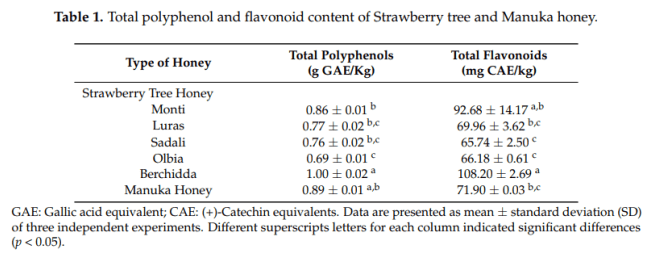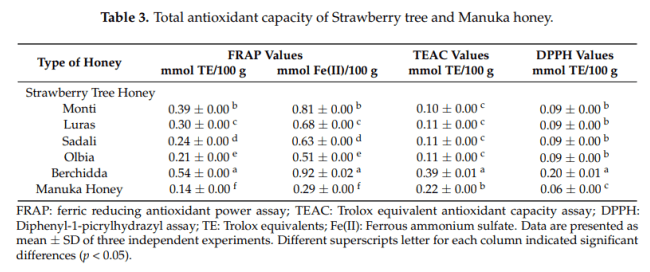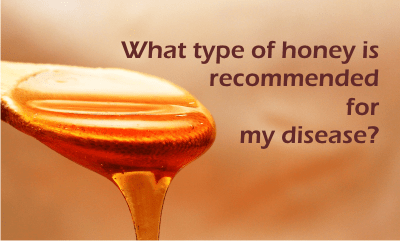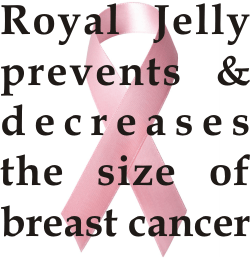Strawberry tree honey, also known as arbutus honey, fits best in our concept of healing products due to its bitter, unpleasant taste.
It’s something deeply rooted in our subconscious: if it’s sweet and pleasant, it’s not healing. Medicine is supposed to be bitter and hard to take. We have to suffer to be healed.
A myth, just like a myth, is the conception that honey is not good for diabetics.
Strawberry tree honey is a rare honey, and though there are beekeepers who make it, big producers are still reluctant; the product doesn’t sell well. But things have started to change, people are now more oriented towards natural medicine, and if there is something that can replace synthetic drugs and their side-effects, it is more welcomed.
Despite its taste, strawberry tree honey has all the other honeys’ health benefits. It can still be used for immunity, for respiratory diseases, for wounds and burns, for cardiovascular conditions, and for digestive issues. It is preventative more than it is curative, just like multifloral honeys or any other type of honey.
And just like the others, it has its particularities, which have now made it famous around the world. In Sardinia, Italy, people are more aware of its medicinal use, and therefore its price is up to 8 times higher than that of regular honey.
And we cannot even blame the producers for being speculative, because the truth is that this type of honey is indeed rare.
What makes strawberry tree honey special?
Its high antioxidant concentration.
It is known that dark honeys are the most powerful antioxidants. The darker, the more powerful. With some lighter-colored exceptions, such as strawberry tree honey from southern Europe and sourwood honey from Malaysia.
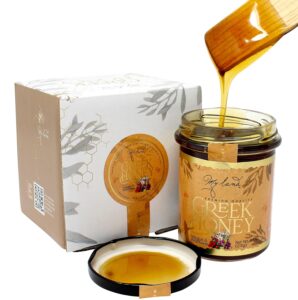
Here are the darkest types of honey and the most powerful antioxidant ones, by some research. Please note that the studies did not include all types of honey, so the list is not complete:
· Buckwheat (Fagopyrum sp.)
· Chinese milk vetch (Astragalus adsurgens)
· Heather (Caluna vulgaris, Erica umbellata)
· Honeydew (all types of honeydew honeys)
· Manuka (Leptospermum Scoparium
· Sweet chestnut (Castanea sativa)
· Tualang (Koompassia excelsa)
· Ceratonia
· Peppermint
Strawberry tree honey from Arbutus menziesii was studied and showed very high antioxidant activity, similar to the one found in Arbutus unedus.
The antioxidant activity of honey has been shown to strongly correlate with the content of phenolic and flavonoid compounds, but they are not solely responsible for this type of activity. There are other constituents such as vitamins, carotenoids, melanoidins, enzymes, organic acids, peptides, and possibly other minor compounds possessing antioxidant capacity.
Homogentisic acid (2,5-dihydroxyphenylacetic acid, HGA) is the main phenolic compound from strawberry tree honey. A marker for this type of honey showed interesting antioxidant and antiradical activities and a protective effect against thermal-cholesterol degradation, comparable to those of well known antioxidants.
As shown in a study from 2011, HGA qualifies as a natural antioxidant, able to exert a significant in vitro protective effect and to contribute to the strawberry tree honey antioxidant activity.
Please read the article Natural antioxidants in honey. Do we really need antioxidant supplements? to find out which are the compounds present in honey that give its antioxidant activity.
What are antioxidants good for?
They are substances that prevent and fight against many chronic and age dependent pathological conditions like cancer, diabetes, atherosclerosis, cataracts, and other chronic pathological conditions.
They act as an antidepressant during high emotional, physical, and intellectual stress.
Honey is, first of all, a preventative. The antioxidants in it are effective in reducing the risk of heart disease, cancer, immune-system decline, different inflammatory processes, and so forth. Among the mechanisms of action are free radical sequestration, hydrogen donation, metallic ion chelation, and their ability to act as substrates for radicals such as superoxide and hydroxyl.
• Only 14 days of strawberry tree honey supplementation had beneficial effects on antioxidant status, hematological indices, serum Fe and enzyme levels.
The pilot study “Beneficial Effects of Strawberry Tree (Arbutus unedo L.) Honey Supplementation in Men“, by Irena Brčić Karačonji et al., from Croatia, published in 2014, assessed the beneficial effects of short-term supplementation of a usual dose of strawberry tree honey on blood and urine parameters in men.
Strawberry honey from Pelješac peninsula, Croatia, was harvested and tested for its authenticity and toxic compounds: hydroquinone and its glycosylated form arbutin, naturally present in strawberry tree plants. In the tested sample, neither arbutin nor hydroquinone were detected.
Participants included 5 adult healthy men with no pathologies, aged 26-38, who consumed 70 g of honey dissolved in 200 ml of water daily for 14 days.
After overnight fasting, blood and urine samples were collected before (day 0) and after (day 15) honey supplementation.
The following parameters were determined: haematological indices, leukocytes, serum enzymes, CRP, chloride, phosphates, Fe, UIBC, and TIBC. Serum concentrations of Ca, Mg, K, Na, Cu, Mn, and Zn, whole blood Cd and Pb, and urine As were measured by ICP-MS. The activity of erythrocyte Cu, Zn-superoxide dismutase (SOD) and whole blood Se-glutathione-peroxidase (GPx) was determined by spectrophotometry.
Results:
The honey supplementation increased serum Fe by 26% and decreased UIBC by 23%, TIBC by 11%, CRP by 10%, alanine aminotransferase (ALT) by 15%, aspartate aminotransferase (AST) and alkaline phosphatase (ALP) by 8%, and SOD and GPx activity by 6%.
It increased the platelet count by 8% and the white blood cell count by 5%.
Other parameters were not affected.
• Fights colon cancer!
Strawberry tree honey has cytotoxic properties against human colon adenocarcinoma
The study Strawberry-Tree Honey Induces Growth Inhibition of Human Colon Cancer Cells and Increases ROS Generation: A Comparison with Manuka Honey., by Afrin S et al. from Italy, published in 2017, showed that strawberry-tree honey and manuka honey can induce cell growth inhibition and ROS generation in colon adenocarcinoma and metastatic cells.
The study investigated the content and effects of samples of strawberry tree honey from different areas of Sardinia, Italy (Monti, Luras, Sadali, Olbia, Berchidda) and compared them to those of manuka honey.
Compared to manuka honey, strawberry tree honey STH (from the Berchidda area) showed the highest amount of phenolic, flavonoid, amino acid and protein content, and antioxidant capacity
Strawberry tree honey from Berchidda area presented the highest concentration of total protein
(0.07 ± 0.00 g BSA/100 g) and free amino acid content (51.67 ± 9.64 mg LE/100 g) than other areas or manuka.
Both honeys induced cytotoxicity and cell death in a dose- and time-dependent manner in human colon carcinoma (HCT-116) and colon metastasis (LoVo cells), with less toxicity on non-cancer cells and both increased intracellular reactive oxygen species (ROS) generation. Strawberry tree honey showed a greater effect at lower concentrations on HCT-116 and LoVo cells.
Conclusion:
Strawberry tree honey and manuka honey can induce cell growth inhibition and ROS generation in colon adenocarcinoma and metastatic cells, which could be due to the presence of phytochemicals with antioxidant properties.
Honey is a good source of biological or pharmacological compounds with antioxidant, antibacterial, anti-inflammatory, antihypertensive, hypoglycemic, anti-proliferative, anticancer, and anti-metastatic activities.
Don’t we have enough antioxidants from our food?
That’s the ideal diet. But it doesn’t always happen this way. Honey is an easy to take “medicine”. We can replace sugar in our morning tea/coffee with honey and get a double effect: pleasure and health. And then complete it with healthy food. Or not, but at least you have offered your body one healthy product.
Dr May Berenbaum, head of University of Illinois Entomology Department says: “Gram for gram, antioxidants in buckwheat honey equal to those of fruits and vegetables.”
Other references:
Studies on the Antioxidant Properties of Tualang Honey of Malaysia
The Honey Book, Stefan Bogdanov, Bee Product Science, February 2014,

